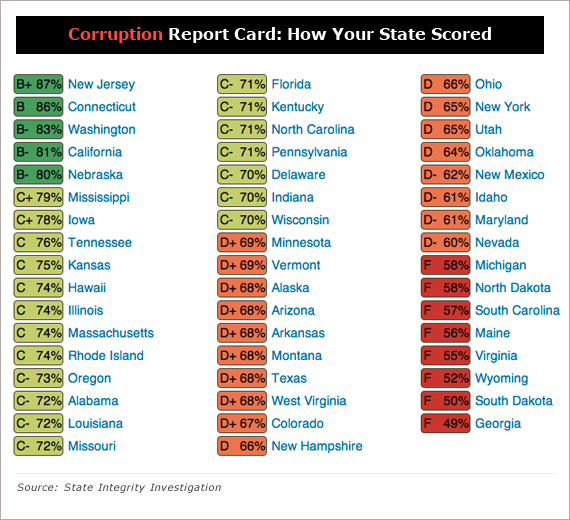New Jersey is known as the home of Snooki, “The Sopranos” – and a long history of crooked and scandal-plagued politicians. So what does it say about the 49 other states in the nation that New Jersey’s state government came out on top in a new ranking of good governance and relatively low risk for official corruption?
New Jersey scored an 87, or a B+, in the study, released Monday by the State Integrity Investigation, a collaboration of the non-profit Center for Public Integrity, Public Radio International and Global Integrity, a Washington, D.C.-based group that measures transparency and accountability in governments worldwide. The report found that, on the whole, state governments are doing a poor job of fighting corruption. (See the full rankings below.) Besides New Jersey, only four other states scored a B- or higher. Georgia, Maine, Michigan, North Dakota, South Carolina, South Dakota, Wyoming and Virginia received F’s. No state got an A.
RELATED: Conflict of Interest Scandal Rocks FDA
The rankings were compiled by local reporters in each state, who researched 330 indicators of “Corruption Risk” across 14 categories of government. Those categories included access to information; campaign finance; accountability across the executive, legislative and judicial branches; budgeting; civil service management; procurement; internal auditing; lobbying disclosure; pension fund management; ethics enforcement; insurance commissions; and redistricting.
That means New Jersey’s top ranking was the result of laws and reforms put in place over time and in the wake of past scandals rather than just recent actions by brash Republican Gov. Chris Christie, who has spoken of his desire to turn around the scandal-marred state’s reputation as a national punch line. Similarly, Illinois received a 74, enough to tie for 10th, despite the high-profile scandal that led to the resignation of former Gov. Rod Blagojevich, who started a 14-year prison term for corruption just last week. “What we found is that states like New Jersey that have a history of corruption tend to have the strongest systems in place to try to protect against future transgressions,” says Randy Barrett, communications director for the Center for Public Integrity.
For example, the Garden State ranked first in ethics enforcement, thanks in large part to ethics rules put in place about six years ago following the resignation of scandal-ridden Gov. Jim McGreevey. The state also scored first in executive branch accountability and got high marks – 96 out of 100 – for being transparent and having strong conflict of interest rules regarding its state pension fund management and procurement. “These aren’t things that people think of necessarily when they think of corruption – you don’t think of the state pension fund,” Barrett says. “But really, that’s where a lot of trouble could happen.” The report did not look at corruption risks at the city, county, or local levels, and plenty of trouble – including some of New Jersey’s recent scandals – takes place at those levels.
“The other thing to keep in mind here is that if you look at states like New Jersey where people are getting caught, that means that some of these laws are actually working,” Barrett says. “It’s a little counter-intuitive, but when you really look at it, that’s part of what’s going on.”






